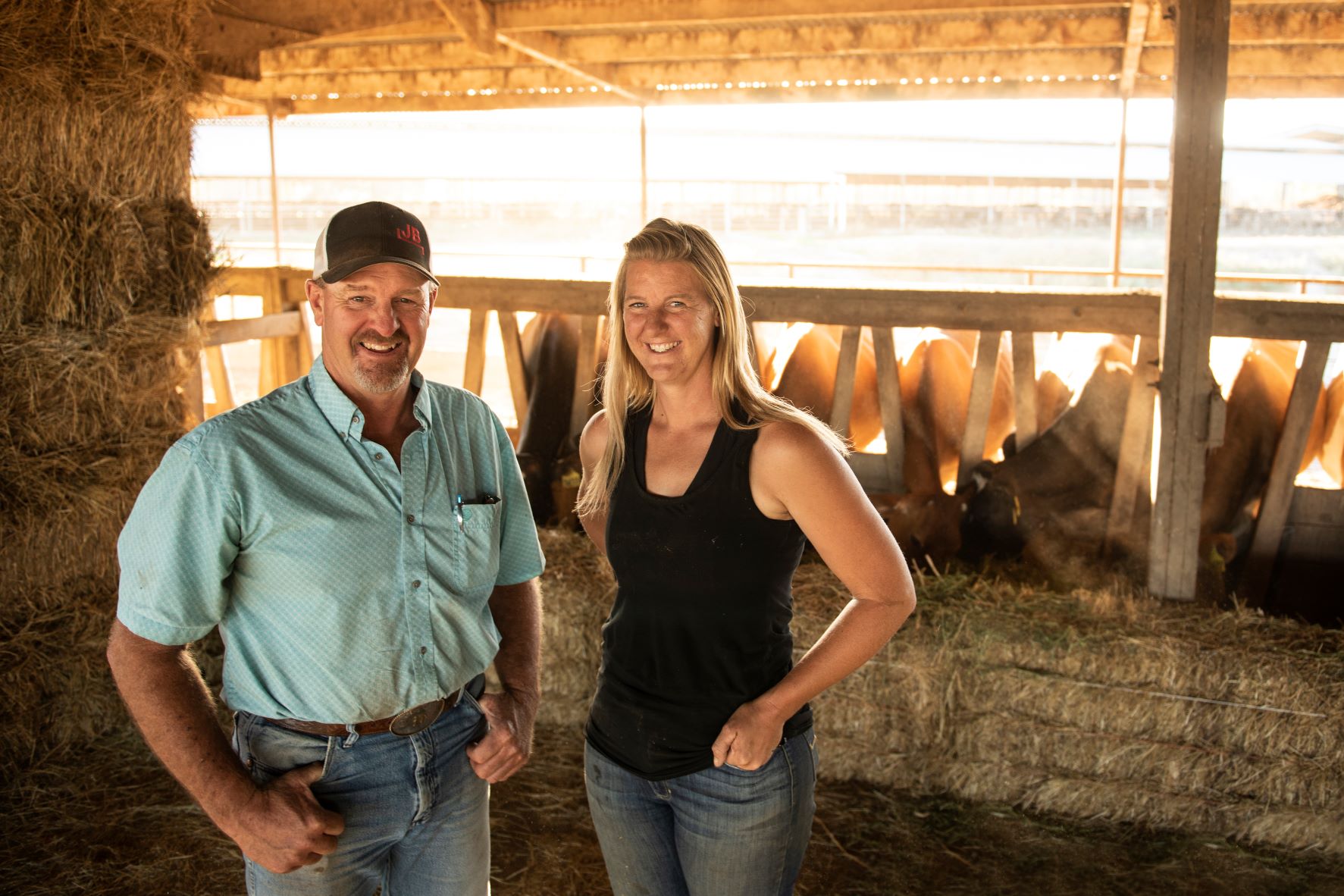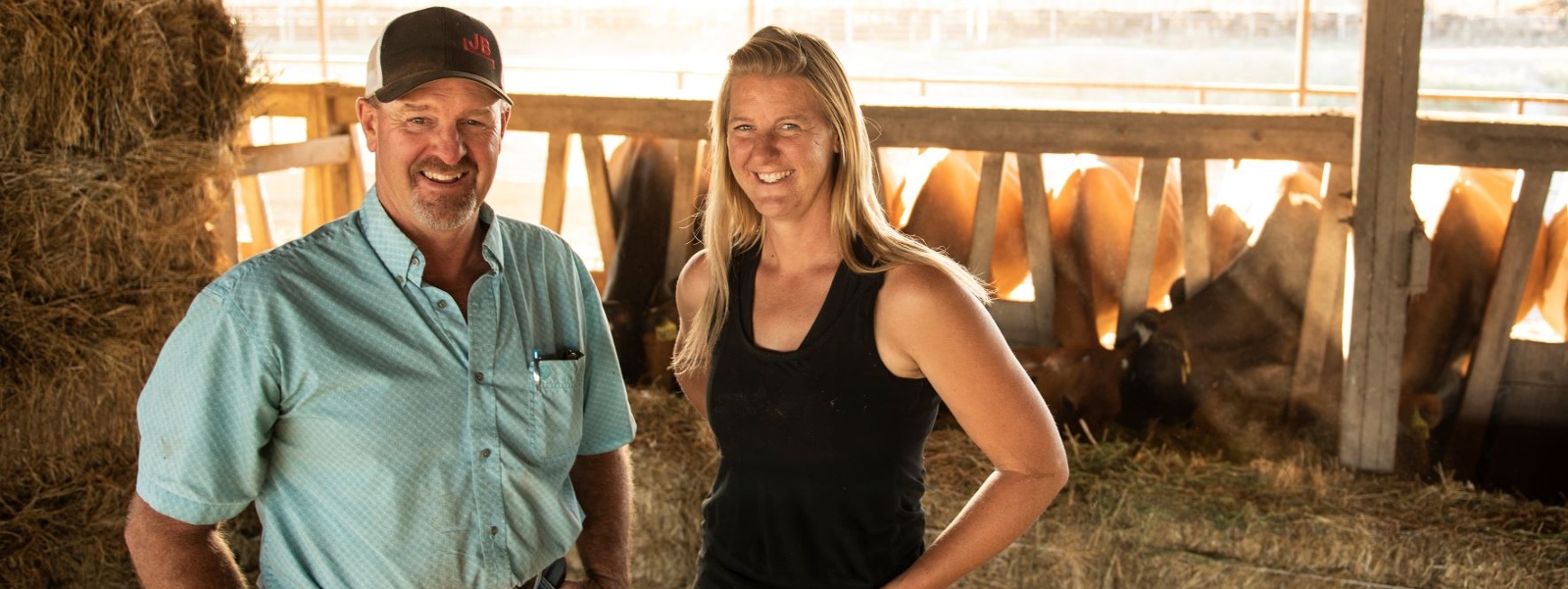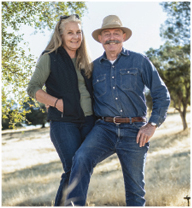Sonoma County dairy farm family wins Leopold award


Doug Beretta and daughter, Jennifer Beretta, prioritize conservation at their dairy farm in Sonoma County.

By Christine Souza
To preserve the land under their care for future generations, many farmers and ranchers employ sustainable practices to maintain natural resources. The Leopold Conservation Award, established in memory of conservationist Aldo Leopold, recognizes agriculturists who inspire others with their dedication to land, water and wildlife habitat on private, working land.
The 2022 award was presented to the Beretta Family Dairy of Sonoma County.
“I’ve tried to be ahead of the curve for a number of years,” said Doug Beretta, who farms with his wife, Sharon, and adult children Ryan and Jennifer, with help from daughter Lisa and her son, Braydon. “The more conservation that I can do to make sure that this property stays in the family and stays as a farm, that’s the biggest thing for me.”
Sardella Ranch of Tuolumne County was an award finalist.
The Leopold Conservation Award in California is made possible thanks to American Farmland Trust, Sustainable Conservation, California Farm Bureau, Sand County Foundation, The Harvey L. & Maud C. Sorensen Foundation, Farm Credit, The Nature Conservancy in California, McDonald’s and California Leopold Conservation Award recipient alumni.
Beretta Family Dairy, Sonoma County
Doug Beretta, who started milking cows on the dairy at a young age, leads the next generations at the Beretta Family Dairy, while carrying on the legacy started by his grandfather.
Beretta Family Dairy is a 100% certified-organic dairy with 300 milk cows and 400 heifers. As a pasture-based dairy, the family manages 400 acres at the home ranch and 120 acres on which the family raises heifers. They lease an additional 150 acres of public land for grazing.
“Conserving is something we do every day. You just do your job and implement projects as they come up and think, this may be neat for the dairy,” Jennifer Beretta said. “It is really neat to be recognized (for this award) and know that you did a good job.”
The family’s conservation efforts include an automatic scraper and separating system that allows them to compost dried manure solids. The compost is applied to pasture to improve soil health and used in the barn for cow bedding. These practices help the dairy reduce its carbon footprint by sequestering carbon and reducing fuel emissions, while also cutting costs.
“My grandfather built the first manure ponds on this ranch in 1968, before the Clean Water Act, because he knew that by capturing manure, he had fertilizer to put back on the ground,” Doug Beretta said. “It means a lot to me to be that kind of an innovator.”
By using compost for animal bedding instead of river sand, the Beretta family has noticed an increase in cow comfort and cleanliness. “The cows love the bedding, and our foot trimmer noticed a difference in our cows’ feet,” Jennifer Beretta said.
The Berettas have partnered with the city of Santa Rosa since the early 1980s on water use and became one of the first producers to accept the city’s recycled wastewater for irrigation. The Berettas also have 75 acres of vernal pools that provide habitat for the California tiger salamander, a federally endangered species, and three endangered flowers.
“Having that 75 acres as critical habitat for tiger salamander, our cows are still able to graze, and that has allowed for the salamander to still thrive and the flowers to still grow,” Jennifer Beretta said.
The Berettas have invited visitors to the family dairy to showcase their conservation work and educate people about agriculture.
“I enjoy getting up every day and being able to work outside, whether it’s pouring down rain or 30 degrees. I love being with the cows, with the land and seeing what we’ve accomplished,” said Jennifer Beretta, who is president of the Sonoma County Farm Bureau. “It’s neat to watch the baby calves be born, get raised up into a milk cow and then see how they produce. It’s neat to plant the fields and watch your crop grow. It’s just fun to watch it all happen.”
Sardella Ranch, Tuolumne County
Mike and Julie Sardella, owners of Sardella Ranch in Tuolumne County, have taken steps to preserve the 523-acre ranch, keeping it as natural as possible for grazing livestock and as habitat for wildlife.
“Growing up with my dad, I was always taught to never overfeed the property and to rotate the cows,” Mike Sardella said. Their cattle leave the property for part of the year to allow the land to regenerate.
Now retired, the couple oversees management of the property and tends to horses, chickens and dogs.
“The animals come first,” Julie Sardella said. The chickens and the horses are fed and watered, she said, “and then we take our high-energy border collies for a half-mile walk—and then we get our coffee.”
The Sardellas lease the ranch to a cattleman who shares the same conservational values. The rancher’s cattle are seasonally grazed to prevent erosion and sustain natural regrowth of grasslands.
Wildlife habitat and water quality have benefited from the Sardellas’ efforts to enhance the riparian habitat along Rough and Ready Creek, a tributary of the Tuolumne River that runs through the ranch. By only using a small portion of their water for stock watering, the Sardellas devote the remainder to naturally enhance the riparian area between the creek and the working land.
“When you have these open spaces, you have a whole ecosystem,” Mike Sardella said. “We have a lot of migratory geese and ducks, the deer come through every year, and then we have bears, bobcats, mountain lions and coyotes, so we try to keep it as natural as we can.”
A partnership that the couple has with Cal Fire, Mike Sardella said, is a win-win because burning clears the land of invasive species and offers the agency a place to train firefighters on control burns. “It opens up the ground to more grass, and the wildlife comes in and feeds off all that new growth,” he said.
To preserve the natural state of the ranch, the couple worked with California Rangeland Trust to be the county’s first property to be placed in a conservation easement. The voluntary, legal agreement permanently limits uses of the land to conserve natural resources.
“As property disappears, the whole lifestyle is going to disappear with it, so it is best to see if we can keep that alive by doing our part,” Mike Sardella said.
The ranch also includes historic features dating from the 1880s, including a mining camp, chapel, remnants from a Chinese labor camp and Native American grinding rocks.
The Sardellas say they are grateful for the Leopold Conservation Award nomination.
“Being a finalist shows us we are on the right track,” Julie Sardella said. “We are listening to the land.”
(Christine Souza is an assistant editor of Ag Alert. She may be contacted at csouza@cfbf.com.)




